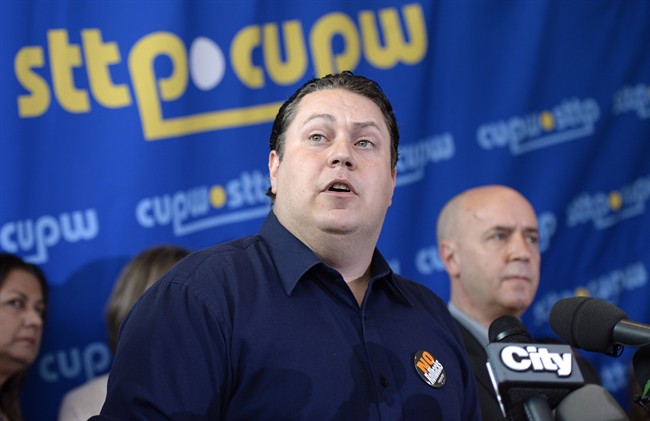Canada Post held its annual public meeting in Ottawa on Friday amid the looming threat of a postal disruption.

But anyone who predicted major drama between union representatives and Canada Post executives was way off the mark.
Aside from some mild heckling, and a few uncomfortable questions for Canada Post executives, both sides struck conciliatory tones at the packed event, seeming to agree the public meeting was not the best place to air labour grievances.
READ MORE: What are the Canada Post talks about anyway?
Ahead of the question-and-answer session, officials also made it clear that they would not entertain direct questions about the ongoing talks.
“The proper place to discuss negotiations is at the negotiating table,” said Canada Post’s interim Chief Commercial Officer, Jacques Côté.
Still, Canadian Union of Postal Workers national president Mike Palecek and other labour representatives did use the opportunity to publicly question executives about the health of the corporation’s pension plan and pay equity between urban and rural workers, both central issues in the ongoing labour talks.
WATCH: Trudeau confident Canada Post agreement will be reached

Côté and Chief Financial Officer Wayne Cheeseman fielded the questions, saying they “stand by” the assertion that the union’s demands will set Canada Post back $1 billion. They would not comment on how much the union’s pay equity demands would cost.

Get breaking National news
Palecek said he came to the meeting mainly in hopes of getting a better sense of the corporation’s financial status.
“We’re mostly here to listen,” the union boss said. “These public meetings generally aren’t the best format to engage in any sort of discussions … certainly the direction of the business affects the bargaining table.”
A ‘brick wall’
Palecek told reporters that he was able to meet with Canada Post president and CEO Deepak Chopra earlier in the morning, and the two discussed the progress of negotiations. Things have not been going well, he noted.
“We’re very far apart at this point … right now it’s like negotiating with a brick wall.”
Chopra, for his part, opened his speech to the hundreds of people who gathered at Canada Post’s headquarters with a warm welcome for Palecek and his fellow labour leaders. Chopra left quickly after the event.
Canada Post did turn a profit in 2015 and in the first quarter of 2016. The first quarter profits-before-tax alone were $35 million, shareholders heard Friday, up from $22 million during the same quarter in 2015.
READ MORE: Looming deadline in Canada Post contract talks resurrects threat of strike
But according to Cheeseman, a continuing drop in letter volume and the “substantial pressure” exerted on the corporation by its pension plan mean Canada Post is “not out of the woods yet.”
Canada Post maintains it is completely unsustainable, with a solvency deficit of over $8 billion, while union representatives say the situation is not nearly as bad as the corporation is alleging.
“While we have reported a profit … this profit is marginal compared to the size of our organization,” Cheeseman said.
Negotiations continue
Meanwhile, the Crown corporation and the union, which represents over 50,000 rural and urban postal employees, continued to negotiate on Friday in hopes of reaching a deal and avoiding a work stoppage.
The union recently asked Canada Post to agree in writing to extend the union’s strike mandate, which expires next Thursday, but Canada Post refused.
“They said (the request) was unprecedented and bizarre,” Palecek said.
“That statement in itself was bizarre. It’s a fairly regular process in collective bargaining … we hope they’ll change their mind.”
Rather than returning to its membership for a fresh 60-day strike mandate, CUPW may issue a 72-hour strike notice sometime in the next few days.
“That’s not the direction we want to go,” Palecek said.








Comments